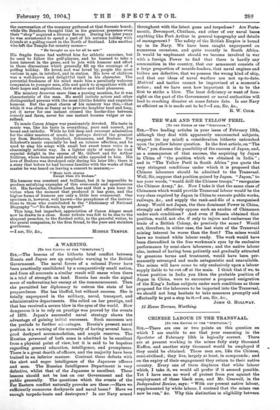[TO THE Eniroit OF THE "SPECTATOR."] SIP, — The lessons of the
hitherto brief conflict between Russia and Japan are an emphatic warning to the British Government. The naval forces of a colossal Power have been practically annihilated by a comparatively small nation, and from all accounts a similar result will ensue when there is atrial of strength on land. Russia has made the signal error of underrating her enemy at the commencement. Then she permitted her diplomacy to outrun the state of her preparedness. She has bluffed, but without success. She is totally unprepared in the military, naval, transport, and administrative departments. She relied on her prestige, and that has received a severe blow in the eyes of the world. How dangerous it is to rely on prestige was proved by the events of 1870. Japan's successful naval strategy shows the advantage of gaining initial successes. Such successes are the prelude to further advantages. Russia's present naval position is a warning of the necessity of having several bases, good dockyard accommodation, and ample reserves. The Russian personnel of both arms is admitted to be excellent from a physical point of view, but it is said to be hopeless regarding general education, intelligence, and promptness. There is a great dearth of officers, and the majority have been trained in an inferior manner. Contrast these defects with the alert and eager intelligence of the Japanese officers and men. The Russian Intelligence Department is very defective, whilst that of the Japanese is excellent. These lessons should not be lost on our Government and the public generally. The questions which the events of the Far Eastern conflict naturally provoke are these :—Have we sufficiently numerous dockyards and naval bases ? Have we enough torpedo-boats and destroyers ? Is our Navy armed throughout with the latest guns and torpedoes ? Are Ports- mouth, Devonport, Chatham, and other of our naval bases anything like Port Arthur in general topography and details of management P The safety of the British Empire is bound up in its Navy. We have been caught unprepared on numerous occasions, and quite recently in South Africa. It would be unpleasant should we become involved in war with a foreign Power to find that there is hardly any ammunition in the country, that our armament consists of a large proportion of muzzle-loaders, that naval engines and boilers are defective, that we possess the wrong kind of ship, and that our ideas of naval warfare are not up-to-date. Matbiel and tactics cannot be improvised at a moment's notice ; and we have seen how important it is to be the first to strike a blow. The least deficiency or want of fore- sight on the part of the Government or naval authorities will lead to crushing disaster at some future date. Is our Navy as efficient as it is made out to be P —I am, Sir, &c.,










































 Previous page
Previous page